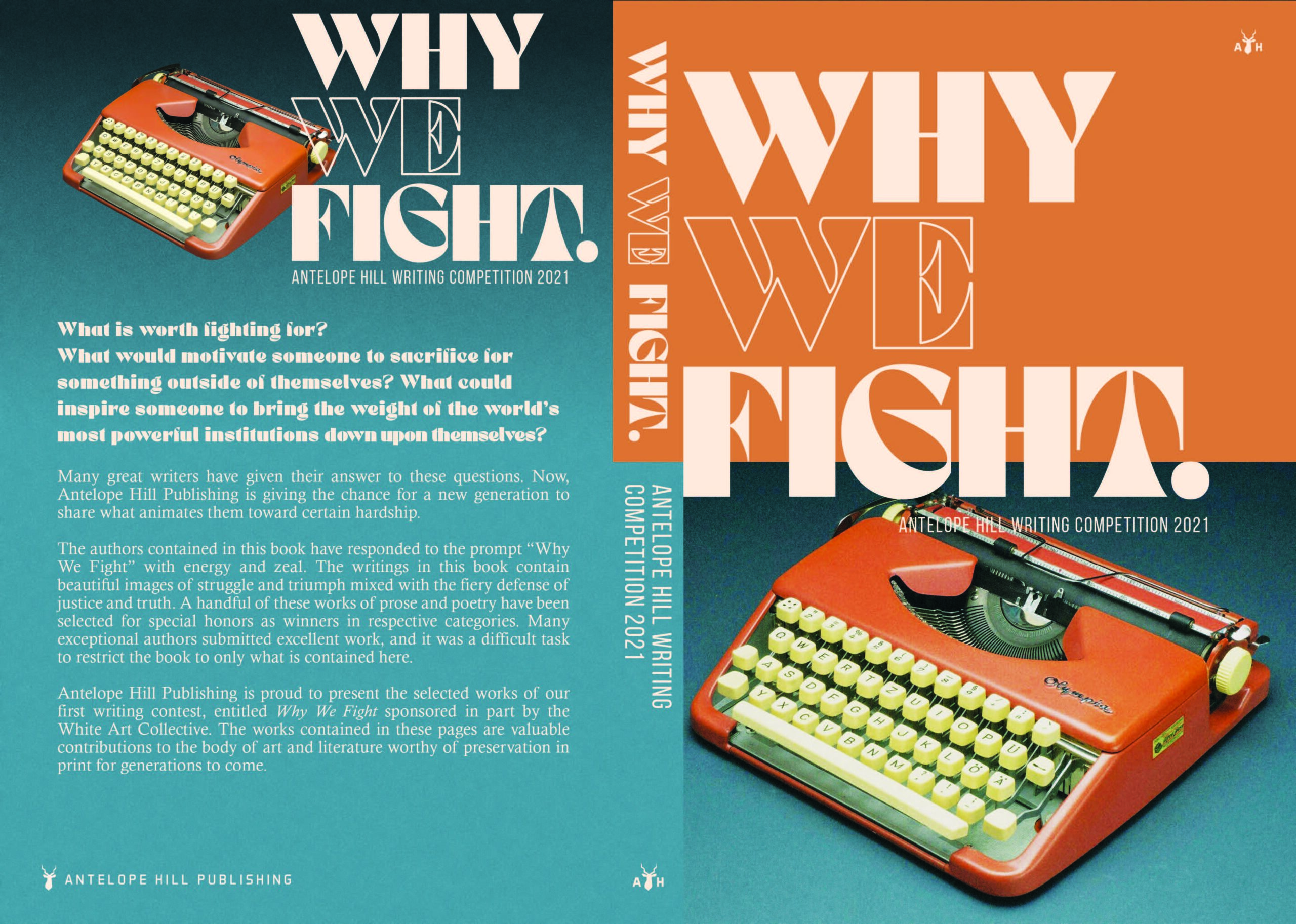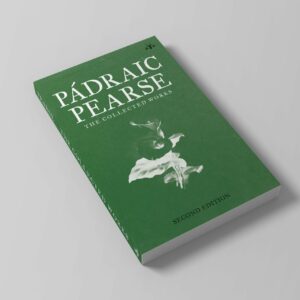Why We Fight: Antelope Hill Writing Competition 2021
$7.45 – $21.89
2021 Writing Competition Preview283 Pages, 6″x9″
DISCOUNT: Purchase it within The Competition Bundle for approximately 15% off: CLICK HERE
Purchasing internationally? Purchase from Amazon: Click here to order
—
What is worth fighting for?
What would motivate someone to sacrifice for something outside of themselves? What could inspire someone to bring the weight of the world’s most powerful institutions down upon themselves?
Many great writers have given their answer to these questions. Now, Antelope Hill Publishing is giving the chance for a new generation to share what animates them toward certain hardship.
The authors contained in this book have responded to the prompt “Why We Fight” with energy and zeal. The writings in this book contain beautiful images of struggle and triumph mixed with the fiery defense of justice and truth. A handful of these works of prose and poetry have been selected for special honors as winners in respective categories. Many exceptional authors submitted excellent work, and it was a difficult task to restrict the book to only what is contained here.
Antelope Hill Publishing is proud to present the selected works of our first writing contest, entitled Why We Fight, sponsored in part by the White Art Collective. The works contained in these pages are valuable contributions to the body of art and literature worthy of preservation in print for generations to come.
Paperback ISBN: 978-1-956887-34-1
Ebook ISBN: 978-1-953730-88-6
| Weight | N/A |
|---|---|
| Dimensions | N/A |
| Format | eBook, Paperback |









David Duke Nukem –
Hail Nike, Hail Antelope Hill, Hail Our People!
Extremely based. Highly recommended.
Nathaniel Scott –
Most people who open book reviews do so to answer the question, “should I read this book?” To save you some time, I’ll be upfront and answer with an emphatic and resounding yes. I was absolutely blown away by the talent and creativity found in our movement, and know that anyone else who picks up this book will be as well. I’ve been interested in poetry for some time, and as astute listeners will remember, even started off Navigating the Collapse with a poem from Kipling. As such the poetry section was especially enjoyable to me, and I found myself tearing up each time I sat down to read it. The prose and essay sections were also emotional and inspiring in a way that cuts to the core of your soul. I can honestly see a textbook from several hundred years in the future showcasing parts of this book under titles like “Early 21st Century Poetry”, “Pre-Reconquest Era Literature”, or “A Glimpse into the Mind of our Ancestors”. There are works that many will find contain messages that will only be understood by people immersed in our culture, and will one day have a paragraph long footnote explaining the context in detail. And there are others that can instantly be understood by anyone, and could be just as easily understood three hundred years ago, or three hundred years from now.
Each work has it’s own special characteristics, and I won’t spoil them for you, but I’d like to mention a few of my personal favorites other than the winners and honorable mentions. Those are titans, spinechilling, reminiscent of authors like Tolkien and Kipling, but I know that readers will usually read them first, so I want to present the other works as well as a reminder than none of them should be skipped.
The Day, by Edward Altura is a beautiful and simple poem that I will undoubtably be reading to my future children before bedtime. It shows the way will be difficult, the struggle generational, and the night long, but there is still comfort in knowing that the day will dawn once again.
The Thoroughbred by John David references Spengler’s famous quote while describing the Roman soldier who stayed at his post in Pompeii because he was never relieved of duty. How could that soldier have known that thousands of years after his death men would look to his last moments as an inspiration to hold our ground? In the same way, while our struggle may seem difficult, impossible, or even meaningless, it will have ramifications that we may never know. Sometimes all we can do is grit our teeth, grasp our spear, and stand.
For the Forest Brothers by Laima Sedula shows the relationships of the Forest Brothers during the aftermath of WW2 in the Baltics, a period and area that many in our movement are less familiar with. Brave men fought against the Soviet occupation for many years, toiling and suffering, while their families and loved ones did the same. This triptych presents the relationships between a brother, a lover, and a mother, present in this fight. It was not long ago that these men and women had their struggle, and it may not be long in the future that we will be put in a similar situation.
The Union by Æthelrey presents the story of a Polish hussar during a war against Islamic invaders. While riding with his troop, he is faced by a situation that brings the nature and potential cost of the war into clear focus, which I won’t spoil. The language is particularly beautiful, on the cusp of being a poem itself. In the modern world it’s easy to forget that historical events had individuals attached to them with similar emotions, goals, and dreams, as us. When we read about a battle fought 500 years ago, it’s hard to wrap your mind around “20,000 dead” meaning that 20,000 homes had an empty seat from then on. Stories like this help bring those facts into reality. By rehumanizing our ancestors in our mind, we can have a far deeper connection to them than before.
Ghost Stories by Casey McDonough depicts a fairly standard modern American man going through one such journey to an understanding of the men of the past. This is something our opponents have never experienced. They have placed our heroes of the past firmly in the category of “Marvel movie villain”. People who’s goal is to destroy the world, or just simply hurt people. We all know that’s not the case, and the characters of the story are presented with this challenge to their worldview and have to resolve that internal dilemma. The whole story is well written and gripping, and especially poignant for anyone with Southern ancestry.
Why We Fight by Arminius is an excellent distillation of that underlying current of the book, as well as a shot in the arm to spur us on toward greater things. I may still do a podcast bit containing this one, so I don’t want to spoil it too much, but I’ll drop the final words here. “Victory is who we are.”
This entire book is like a highly concentrated anti-depressant and pre-workout mix in written form. There are many works contained herein that I have not mentioned that deeply affected me. I encourage anyone to try it, read it slowly, one or two works at a time, and speak all poetry out loud. Whether our grandchildren will be studying in a quiet schoolhouse, or a remote forest grove, this is one of the books they will be reading. Hail Victory